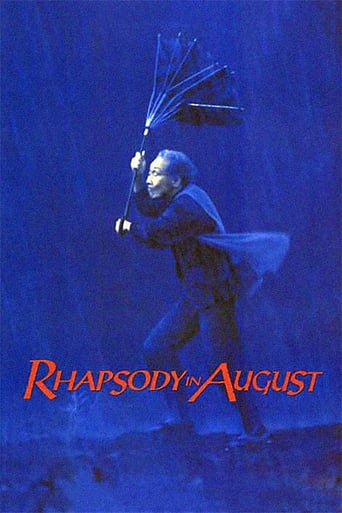Anssi Vartiainen
The second to last film made by Akira Kurosawa. A film about three generations of Japanese forced to deal with the atomic bombing and its consequences. Also starring Richard Gere, for some weird reason.I'm vividly reminded of Isao Takahata of Studio Ghibli as I watch this film. He is a masterful film maker as well, but this is the first film from Kurosawa that I've seen where I felt I was not Japanese enough to fully get it. With Takahata that's most of his films. What the atomic bombs meant for Japan, and still do, is not something that can be easily understood by foreigners, and this film is not the one to explain it to them. Then again, I don't think that's its purpose. It's more of an essay to categorize how the Japanese themselves feel about the bombings.But, because I'm probably missing over half of what the film is trying to say, I'm left with a film that moves around languishingly, contains emotional cues which I have no way of getting, is very much subject matter over good story, and has Richard Gere in it.What am I supposed to say about a film like this? It's good. Probably. I assume... I mean, it's Kurosawa. And I don't regret seeing it. But I also didn't really get it.I need to study some history. Let's call it average in the meantime.
Hitchcoc
This movie is not about whether the bomb should have been dropped. It is about war and the spoils of war. The grandma tells the children about death and destruction that happen when two forces attack one another. The problem in 1945 was that nuclear weapons were unleashed. However, going back in time, as soon as primitive man had sticks, they used them to bash each other over the head and the belongings went to the winner. This is a quiet tale of four Japanese teens who are being looked after by their grandma. She listens to them complain (even though their experiences are non-existent) and sends them off to investigate the city of Nagasaki. They are touched by the stories of the people who survived. They await a trip to Hawaii to see the brother of their grandmother, who is ill. Things get complicated due to the return of the parents and some miscommunication. The family is visited by a relative played by a very young Richard Gere. He is soft spoken and respectful. But the biggest scene stealer is the the grandma. She is so complex and believable. The final scene is striking cinematography. We learn the resiliency of the people and their efforts to hang on to the memories of those they lost and the evils of war in general. Quite a different tack for Kurosawa.
trochesset
The casting and dressing of the children. Not only are all of them horrible little actors, but their constumes are hideous, and the writing for them makes me cringe. If they weren't the main characters and the ones carrying the story along, then I may be able to overlook these flaws, but these are no minor flaws.The best parts of the film involve the grandma, be it her at the temple, her during the lightning storm at the house, or her running off in the rain, these were all well acted, all well shot, but not enough to save this production.Of the 19 Kurosawa films I have seen, this is easily the worst.3/10
counterrevolutionary
RHAPSODY IN AUGUST is not an anti-American film. Although some of the characters express anti-American sentiments, the film rejects them. And Richard Gere's character does not apologize for the atomic bombing (which would have been unforgivably presumptuous of Kurosawa). He apologizes for his family's ignorance of the fate of his uncle.But that's not to say that this is a good film. Kurosawa hectors the audience, which is a thing he hardly ever does. And surely Kurosawa could have found a more interesting American actor than Richard Gere to play Clark. And it is true that Kurosawa, while eschewing an anti-American stance, does try to pin the blame on "war," meaning that he tries to parcel the blame out equally. But of course, the blame for WWII isn't shared equally. Perhaps having Clark mention that his mother's brother died at Pearl Harbor, or making his wife a Chinese-American whose parents were murdered at Nanking, might have served as a prophylactic against this moral failing. Of course, this might have meant that Kurosawa would have had to come to terms with his own past as a wartime propagandist for the government which committed those crimes.Perhaps the silliest aspect of the film is its indignant insistence that Americans don't want to discuss the bombings.Please. We discuss it all the time. We debate, and we agonize, and we yammer endlessly about what might have happened, and what did Truman think might have happened, and what if this and what if that. We also talk about the firebombings of Tokyo and Dresden, the sellout to Stalin at Yalta, and all the other things we did which are at least morally questionable if not criminal.And to have this point of view put forth in a film which studiously avoids mention of Pearl Harbor, Nanking, the Philippines, Bataan, the atrocities in the POW camps, or any other undoubted crimes committed by the Japanese government is particularly galling.All in all, the poorest of the 22 Kurosawa films which I have seen. The only thing here to which I can give unqualified praise is the remarkable performance of Sachiko Murase as Kane.



